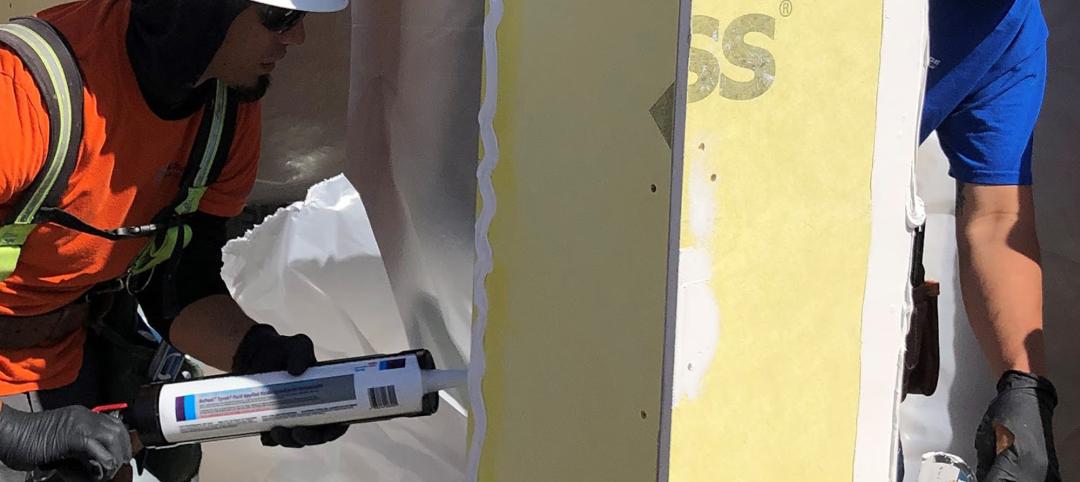Architectural-grade insulation is energy-efficient, moisture resistant
 ACH Foam Technologies’ new EPS architectural-grade insulation, Foam-Control Plus+, can be used in a wide range of applications, such as perimeter insulation, under-slab insulation, cavity wall insulation, sheathing, precast concrete applications, green roofs, plaza decks, and waterproofing applications—especially where its moisture-resistant properties can be a benefit. ACH Foam provides Foam-Control Plus+ in 2x8-foot and 4x8-foot sheets up to 36 inches thick.
ACH Foam Technologies’ new EPS architectural-grade insulation, Foam-Control Plus+, can be used in a wide range of applications, such as perimeter insulation, under-slab insulation, cavity wall insulation, sheathing, precast concrete applications, green roofs, plaza decks, and waterproofing applications—especially where its moisture-resistant properties can be a benefit. ACH Foam provides Foam-Control Plus+ in 2x8-foot and 4x8-foot sheets up to 36 inches thick.
ACH Foam Technologies
[pagebreak]
Ceiling panels increase fire rating
 Class-A fire-rated panels from WoodTrac are available in three finishes: Abbey Oak, Bank Alder, and White/Paintable. Panels can be installed in any 2x2-foot or 2x4-foot suspended ceiling. The manufacturer has provided three profiles of moldings: Tear Drop, Colonial, and Cove. Moldings can be installed over any 15/16-inch or one-inch-wide ceiling grid. Panels can be combined with any molding profile and molding finish to match the desired look. Class-A panels are made of 3/8-inch-thick fire-rated board laminated on both sides with high-definition micropaper.
Class-A fire-rated panels from WoodTrac are available in three finishes: Abbey Oak, Bank Alder, and White/Paintable. Panels can be installed in any 2x2-foot or 2x4-foot suspended ceiling. The manufacturer has provided three profiles of moldings: Tear Drop, Colonial, and Cove. Moldings can be installed over any 15/16-inch or one-inch-wide ceiling grid. Panels can be combined with any molding profile and molding finish to match the desired look. Class-A panels are made of 3/8-inch-thick fire-rated board laminated on both sides with high-definition micropaper.
WOODTRAC
[pagebreak]
Sunshades reduce solar heat, improve energy performance
 Architectural sunshades from Gamco include pre-engineered louver blades, outrigger supports, and mounting brackets. The sunshade blades are offered in several standard and custom shapes, including tubular profiles. Fabricated from lightweight aluminum, the sunshade blades are available in anodized or a wide variety of painted finishes. Outriggers are available in standard depths of 24 and 30 inches, as well as custom sizes, in either stainless or painted steel to assure strength and durability. Gamco’s adaptable mounting bracket systems are used to securely anchor the sunshade outriggers to the building façade.
Architectural sunshades from Gamco include pre-engineered louver blades, outrigger supports, and mounting brackets. The sunshade blades are offered in several standard and custom shapes, including tubular profiles. Fabricated from lightweight aluminum, the sunshade blades are available in anodized or a wide variety of painted finishes. Outriggers are available in standard depths of 24 and 30 inches, as well as custom sizes, in either stainless or painted steel to assure strength and durability. Gamco’s adaptable mounting bracket systems are used to securely anchor the sunshade outriggers to the building façade.
GAMCO Corp.
Related Stories
AEC Innovators | Mar 3, 2023
Meet BD+C's 2023 AEC Innovators
More than ever, AEC firms and their suppliers are wedding innovation with corporate responsibility. How they are addressing climate change usually gets the headlines. But as the following articles in our AEC Innovators package chronicle, companies are attempting to make an impact as well on the integrity of their supply chains, the reduction of construction waste, and answering calls for more affordable housing and homeless shelters. As often as not, these companies are partnering with municipalities and nonprofit interest groups to help guide their production.
Codes | Mar 2, 2023
Biden Administration’s proposed building materials rules increase domestic requirements
The Biden Administration’s proposal on building materials rules used on federal construction and federally funded state and local buildings would significantly boost the made-in-America mandate. In the past, products could qualify as domestically made if at least 55% of the value of their components were from the U.S.
AEC Innovators | Mar 2, 2023
Turner Construction extends its ESG commitment to thwarting forced labor in its supply chain
Turner Construction joins a growing AEC industry movement, inspired by the Design for Freedom initiative, to eliminate forced labor and child labor from the production and distribution of building products.
AEC Innovators | Feb 28, 2023
Meet the 'urban miner' who is rethinking how we deconstruct and reuse buildings
New Horizon Urban Mining, a demolition firm in the Netherlands, has hitched its business model to construction materials recycling. It's plan: deconstruct buildings and infrastructure and sell the building products for reuse in new construction. New Horizon and its Founder Michel Baars have been named 2023 AEC Innovators by Building Design+Construction editors.
Codes and Standards | Feb 8, 2023
GSA releases draft of federal low embodied carbon material standards
The General Services Administration recently released a document that outlines standards for low embodied carbon materials and products to be used on federal construction projects.
Concrete | Jan 24, 2023
Researchers investigate ancient Roman concrete to make durable, lower carbon mortar
Researchers have turned to an ancient Roman concrete recipe to develop more durable concrete that lasts for centuries and can potentially reduce the carbon impact of the built environment.
Standards | Jan 19, 2023
Fenestration Alliance updates liquid applied flashing standard
The Fenestration and Glazing Industry Alliance (FGIA) published an update to its Liquid Applied Flashing Standard. The document contains minimum performance requirements for liquid applied flashing used to provide water-resistive seals around exterior wall openings in buildings.
Sponsored | Resiliency | Dec 14, 2022
Flood protection: What building owners need to know to protect their properties
This course from Walter P Moore examines numerous flood protection approaches and building owner needs before delving into the flood protection process. Determining the flood resilience of a property can provide a good understanding of risk associated costs.
K-12 Schools | Nov 30, 2022
School districts are prioritizing federal funds for air filtration, HVAC upgrades
U.S. school districts are widely planning to use funds from last year’s American Rescue Plan (ARP) to upgrade or improve air filtration and heating/cooling systems, according to a report from the Center for Green Schools at the U.S. Green Building Council. The report, “School Facilities Funding in the Pandemic,” says air filtration and HVAC upgrades are the top facility improvement choice for the 5,004 school districts included in the analysis.
University Buildings | Nov 13, 2022
University of Washington opens mass timber business school building
Founders Hall at the University of Washington Foster School of Business, the first mass timber building at Seattle campus of Univ. of Washington, was recently completed. The 84,800-sf building creates a new hub for community, entrepreneurship, and innovation, according the project’s design architect LMN Architects.















